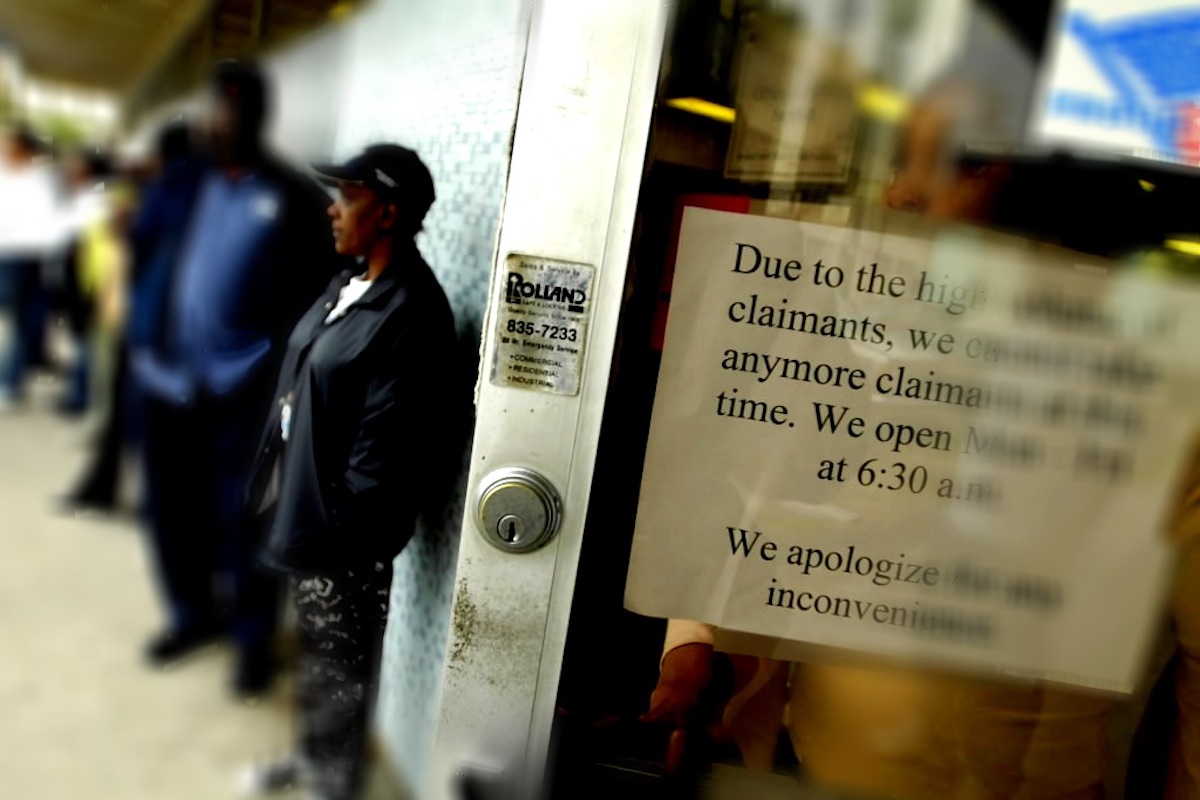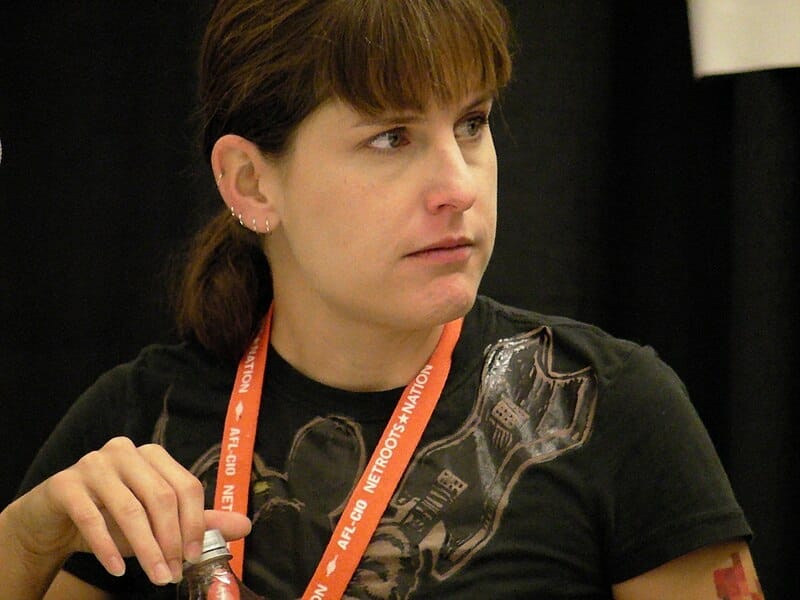COVID-19
Yes, People Are Dying. But It’s Still Okay to Worry About Your Job
When people are dying horrible deaths in isolation from loved ones, and essential workers are putting themselves and their families at risk by going into danger zones, this isn’t the time to focus on how much we’ll “repay” young, healthy people who, though worried and unemployed, are safe at home.

Amanda Marcotte is a political writer for the left-leaning website Salon, and the author of Troll Nation: How The Right Became Trump-Worshipping Monsters Set On Rat-F*cking Liberals, America, and Truth Itself. On March 24th, in the midst of national and international discussions about what governments should be doing to manage the economic consequences of the COVID-19 pandemic, she tweeted as follows:
I don’t want people to die. But liberals are not helping by pressuring young people to give up jobs, savings and hope of a brighter future as if it’s a sacrifice they should make without complaint or any expectation of repayment, just because it’s the right thing to do.
The conversation should solely be framed as this, “We are asking young people to give up a lot, and to save mostly older people. So how are we going to pay them back? What sacrifice will be demanded to make them whole?”
I appreciate how people want to seem moral and righteous. But I want to underline the “contract” part of “social contract.” It is not justice to make young people give up their futures. We need to repay them, with interest.
People’s fears about losing jobs, losing houses, and watching retirement savings disappear are not minor. And if we fail to take them seriously, they will start to listen to Trump and others who say we have to re-open the economy.
Getting trolled from the Right is all in a day’s work for Marcotte. But following her publication of this thread, members of her own tribe rose to shout her down, calling her: twisted, disturbed, crazy, narcissistic, sociopathic, entitled, privileged, murderous, stupid, ageist, moronic, callous, reckless, selfish, repulsive, ghoulish, and disgusting. It did not take long for Godwin’s Law to take effect.
Some of this vitriol can be attributed to Marcotte’s unfortunate timing, coming amidst a parallel discussion among conservatives about whether the (economic) costs of pandemic mitigation were worse than the (health) costs of doing nothing—a discussion that included such infamous gems as this one from a San Diego lawyer: “The fundamental problem is whether we are going to tank the entire economy to save 2.5% of the population, which is (1) generally expensive to maintain, and (2) not productive.”
In this context, it was clumsy of Marcotte to start with “I don’t want people to die, but…” Even a charitable reader had to wait until the thread finale to learn that she actually does support pandemic control measures designed to minimize mortality.

Some commenters were confused as to why Marcotte would pit young against old, given that the novel coronavirus can also endanger younger people, and that old people will share the economic suffering caused by the pandemic. One wonders whether the intergenerational blame game that characterizes climate-change politics has made progressive writers think that boomer-bashing will always be treated as an acceptable tactic.
Such is the topsy-turvy world of hyper-polarization: As soon as even a few conservatives started openly discussing whether saving old people was worth the price, progressives reflexively rose to senior citizens’ defence. Marcotte apparently did not get the memo.
Marcotte’s alleged ageism wasn’t the only thing that provoked widespread ire, though. Her demand that younger workers need to be repaid “with interest” was also a target for criticism. The COVID-19 pandemic is a unique challenge to humanity, and the outcome depends on our collective willingness to put the greater good before individual interests. When people are dying horrible deaths in isolation from loved ones, and essential workers are putting themselves and their families at risk by going into danger zones, this isn’t the time to focus on how much we’ll “repay” young, healthy people who, though worried and unemployed, are safe at home.
Yet there is also something unfair about the way Marcotte was treated. She was hardly the only public figure fretting about COVID-19’s economic fallout. The leaders of all OECD nations are, on some level, starting to think about the best way to un-thaw their economies once the pandemic has been suppressed, or at least controlled. Certainly, many figures on the Right had few qualms about defending corporate interests amid the economic tumult, and Donald Trump himself often has seemed more concerned with the stock market than the supply of respirators.
This is about more than Marcotte: As lobbyists of all stripes have sought to claim a piece of the US government’s massive relief package, wasn’t it the Left’s role to defend the interests of those whose fortunes are precarious?
Marcotte was directly addressing those on the Left who were failing to take seriously “people’s fears about losing jobs, losing houses, and watching retirement savings disappear.” While it sounds odd that anyone on the Left would need such a reprimand, Marcotte perhaps knew that such a reminder was necessary. Many activists on the Left (and Right) are now more energized by the hashtag culture wars than traditional class warfare.
This is partly because many of the most vigorous culture warriors on the Left are members of the chattering class rather than the working class. Moreover, progressives have been instilled with knee-jerk habits designed to enforce privilege checking. They fear a collective background admonition that goes, in effect: There is always someone who has had it worse than you, therefore you have no right to complain about your own situation. And if you do complain, you are worse than selfish. You are actively harming those who have had it worse than you. This is basically the edict that Marcotte violated—even though the victims here are the same older Americans who’ve been reviled by progressives for putting Trump into office (among various other crimes).

Marcotte may well be vindicated somewhat in coming months, as the economic consequences of the pandemic catch up with the health consequences. Many people of all stripes will suffer. Current estimates suggest that the unemployment rate could climb above 30 percent in the United States—higher than the Depression-era peak.
Even the Financial Times, hardly the Daily Worker, recently editorialized its concerns on this issue. Ironically, this conservative publication received little blowback (to my knowledge) for raising the same concerns about young workers that had gotten the progressive Marcotte into hot water:
The way we wage war on the virus benefits some at the expense of others. The victims of Covid-19 are overwhelmingly the old. But the biggest victims of the lockdowns are the young and active, who are asked to suspend their education and forgo precious income. Sacrifices are inevitable, but every society must demonstrate how it will offer restitution to those who bear the heaviest burden of national efforts. Radical reforms — reversing the prevailing policy direction of the last four decades — will need to be put on the table.
* * *
Once the negative replies started rolling in, Marcotte tried to redirect people to the political argument she was trying to make:
Anyway, I’m thinking about not just being decent and kind to young people, but also strategically: A message of “you will give up your futures so others can live” is not a winning one. “We will fight like hell so you can be repaid for this sacrifice” is a winning one.
“Tough” and “too bad” continue not to be sufficient answers from so-called liberals when people worry about losing income and homes. Thank god the Democrats in Congress see this, but that liberals on Twitter don’t is mind-boggling.
“Tough” is not the answer when people say they are scared of losing a job, losing savings, losing a home. That so many liberals said otherwise is heartbreaking. It also makes me afraid that we’re going to lose to Trump.
I’m not here to defend Marcotte’s broader political agenda. But on these points, she is correct. Sucks-to-be-you generally isn’t a winning message in a democratic country. And Trump, for all his failures, is smart enough to avoid chastising his supporters for self-pity. Nor does he hesitate to echo their economic concerns. As Bret Stephens of the New York Times recently opined:
One reason I suspect Trump is benefiting politically from the pandemic is that he’s been talking about minimizing the economic fallout and getting the country back to work. That might be irresponsible from a medical and epidemiological point of view. But it resonates with millions of Americans, especially small business owners and their employees faced with complete financial ruin if the shutdowns carry on for months.
As Marcotte points out, the Democrats take people’s economic concerns seriously. Senator Bernie Sanders, a (now long-shot) presidential candidate, fought hard to maximize the unemployment benefits included in the massive economic stimulus package, rather than telling those losing their jobs that things could be worse. Voters want to be represented by someone who will fight for their interests, and there should be no shame in that. That “liberals on Twitter” (as Marcotte calls them) disagree is, indeed, “mind-boggling.”
We are all afraid for our health right now, but some are at greater risk. And the same is true of our economic fortunes. One wonders whether those who would shame Marcotte have things a little better than others. Just because death is the worst fate of all should not preclude us from articulating all-too-justified fears about unemployment and poverty.






